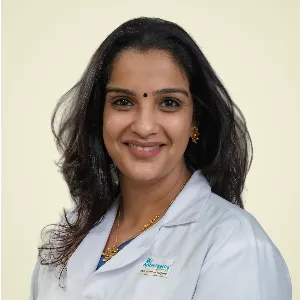PCOD Diagnosis & Treatment in MRC Nagar, Chennai
PCOD or polycystic ovarian disease is a hormonal disorder. Due to the formation of cysts, ovaries become larger and produce a large amount of androgen. Still, the exact cause of PCOD is unknown but early diagnosis provides you with relief, with risk factors such as type 2 diabetes, and heart diseases. You must consult a gynecologist near you.
What is PCOD?
Every month, one egg matures from either of your ovaries (ovulation), and in the absence of pregnancy, it is followed by menstruation. Ovaries naturally produce hormones like estrogen, progesterone and androgen (male sex hormone). In some women, due to hormonal imbalance, ovaries release immature or partially mature eggs during ovulation. Such eggs turn into cysts and lead to a condition termed PCOD. This results in irregular menstruation, abdominal weight gain, infertility and male pattern hair growth. Hence, you need to get diagnosed by a gynecologist in Chennai.
What are the symptoms of PCOD?
- Irregular menstruation due to lack of regular ovulation
- Heavy bleeding
- Hair growth and pattern baldness (hirsutism)
- Acne
- Abdominal weight gain
- Headaches
What causes PCOD?
Other than family history, there could be many factors resulting in PCOD in women, such as:
- There are many genes associated with PCOD that you might inherit from your parents.
- If your cells become resistant to the action of insulin, this increases blood sugar level, and thus increases androgen (male hormone) production.
- If ovaries produce more than the usual amount of androgen, it can result in acne and male pattern baldness.
- If you have low-grade inflammation, then this stimulates polycystic ovaries to produce androgens.
When do you need to see a doctor?
You must visit a gynecologist in Chennai if your periods are irregular and you are experiencing infertility. If you are suffering from unusual hair growth and male pattern baldness as well, the doctor will perform tests to detect PCOD.
Request an appointment at Apollo Spectra Hospitals, MRC Nagar, Chennai.
Call 1860 500 2244 to book an appointment.
How is PCOD diagnosed?
While diagnosing PCOD, the doctor focuses on symptoms like irregular menstrual cycles, cysts in ovaries, high androgen levels and body hair growth. Various diagnostic tests for PCOD include:
- Physical examination – It includes checking signs of hair growth, acne and insulin resistance.
- Pelvic examination – Involves examination of the ovaries and uterus.
- Blood tests – Blood tests help check the level of male hormones, cholesterol level, insulin and triglyceride in your body.
- Ultrasound – Ultrasound waves help look out for the presence of cysts in the ovaries and problems in the uterus.
How is PCOD treated?
While treating PCOD, the doctor focuses on lowering the blood sugar level, treatment of hirsutism, restoration of fertility and preventing endometrial cancer in women. Various treatments available for PCOD include:
- Medications like metformin decrease insulin resistance and regulate ovulation.
- The menstrual cycle will become regular after the prescription of progesterone-containing birth control pills.
- Clomiphene citrate helps in regulating ovulation in women.
- Laser hair removal can help you get rid of unwanted hair from your body.
- Ovarian drilling procedure restores normal ovulation by making tiny holes in your ovaries.
What are the risks?
- Risk of endometrial cancer and breast cancer
- Obesity
- High blood pressure
- Diabetes
- Infertility
- High cholesterol level
- Sleep apnea
- Stroke
- Miscarriage
- Anxiety and depression
Conclusion
PCOD is one of the challenging diseases in women since it affects their health and daily life to a great extent. There is no cure for the disease, but, with the help of some treatments, other disorders associated with it like irregular periods, acne and hormonal imbalance can be cured. Get yourself diagnosed early.
Yes, even after suffering from PCOD, you can get pregnant, but you need to control your weight and blood sugar level. Along with this, you can be prescribed fertility medications by your gynecologist.
No, PCOD cannot be completely cured after pregnancy. During pregnancy, symptoms related to PCOD could go away, and might lead to improvement in menstrual cycles.
There is no definite cure, but you can control it by lifestyle management. You can control the severity of PCOD by regular exercise and a healthy diet.
You can consume dairy products while suffering from PCOD. But the consumption should be limited since excess consumption of milk can lead to an increase in carbohydrate content in the body leading to an increase in glucose levels.
Symptoms
Our Doctors
DR. CHELLAMMAL K R
MBBS, MD (OBSTETRICS...
| Experience | : | 24 Yeras Experience |
|---|---|---|
| Speciality | : | Obstetrics and Gynae... | Location | : | Alwarpet |
| Timings | : | Available on prior a... |
DR. MEENAKSHI SUNDARAM
MD,DNB, DIPLOMA IN A...
| Experience | : | 17 Yeras Experience |
|---|---|---|
| Speciality | : | Obstetrics & Gynaeco... | Location | : | Alwarpet |
| Timings | : | Mon - Sat: 4:30 PM t... |
DR. DHWARAGA
M.B.B.S, DGO,MS...
| Experience | : | 10 Yeras Experience |
|---|---|---|
| Speciality | : | Obstetrics & Gynaeco... | Location | : | MRC Nagar |
| Timings | : | Available by prior a... |
DR. ANILASRE ATLURI
M.S.(OBG), FMAS, DMA...
| Experience | : | 13 Yeras Experience |
|---|---|---|
| Speciality | : | Obstetrics & Gynaeco... | Location | : | Alwarpet |
| Timings | : | Mon - Sat (11:00 AM ... |
DR. MEERA RAGHAVAN
MBBS, DNB...
| Experience | : | 23 Yeras Experience |
|---|---|---|
| Speciality | : | Obstetrics & Gynaeco... | Location | : | Alwarpet |
| Timings | : | Tue, Thur, Sat: 2:30... |
DR. G RADHIKA
MBBS, DGO, DNB (O&G)...
| Experience | : | 14 Yeras Experience |
|---|---|---|
| Speciality | : | Obstetrics & Gynaeco... | Location | : | Alwarpet |
| Timings | : | Mon - Sat : 10:00 AM... |
DR MEENAKSHI B
MBBS,DGO,FMAS...
| Experience | : | 10 Yeras Experience |
|---|---|---|
| Speciality | : | Obstetrics & Gynaeco... | Location | : | MRC Nagar |
| Timings | : | Mon - Sat : 6:30 PM ... |
DR SULTHANA NASEEMA BANU N N
MBBS, MS, DNB, FMAS...
| Experience | : | 5 Yeras Experience |
|---|---|---|
| Speciality | : | Obstetrics & Gynaeco... | Location | : | MRC Nagar |
| Timings | : | Mon - Sat : 8:30 AM ... |
Our Top Specialities
NOTICE BOARD
CONTACT US
CONTACT US
 Book Appointment
Book Appointment










.svg)
.svg)
.svg)
.svg)








